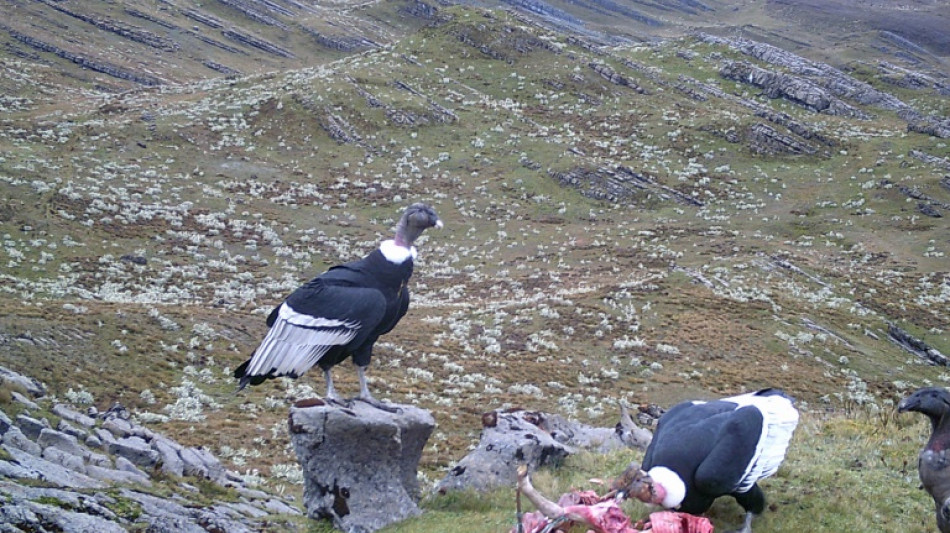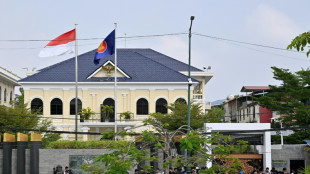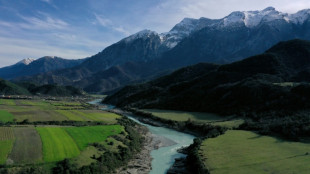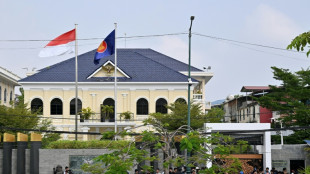
-
 Trump rules out force against Greenland but demands 'immediate' talks
Trump rules out force against Greenland but demands 'immediate' talks
-
Israeli strike kills three Gaza journalists including AFP freelancer

-
 US Congress targets Clintons in Epstein contempt fight
US Congress targets Clintons in Epstein contempt fight
-
Huge lines, laughs and gasps as Trump addresses Davos elites

-
 Trump at Davos demands 'immediate' Greenland talks but rules out force
Trump at Davos demands 'immediate' Greenland talks but rules out force
-
Australia pauses for victims of Bondi Beach shooting

-
 Prince Harry says tabloid coverage felt like 'full blown stalking'
Prince Harry says tabloid coverage felt like 'full blown stalking'
-
Galthie drops experienced trio for France's Six Nations opener

-
 Over 1,400 Indonesians leave Cambodian scam groups in five days: embassy
Over 1,400 Indonesians leave Cambodian scam groups in five days: embassy
-
ICC rejects Bangladesh's plea to play T20 World Cup matches outside India

-
 Prince Harry says UK tabloid court battle in 'public's interest'
Prince Harry says UK tabloid court battle in 'public's interest'
-
Trump lands in Davos to push Greenland claims

-
 Balkan wild rivers in steady decline: study
Balkan wild rivers in steady decline: study
-
Injured Capuozzo misses out on Italy Six Nations squad

-
 Mourners pay last respects to Italian icon Valentino
Mourners pay last respects to Italian icon Valentino
-
EU parliament refers Mercosur trade deal to bloc's top court

-
 Odermatt seeks first Kitzbuehel victory with eye on Olympics
Odermatt seeks first Kitzbuehel victory with eye on Olympics
-
Italy's Brignone to be rested for Spindleruv Mlyn giant slalom

-
 Alcaraz spearheads big names into Australian Open third round
Alcaraz spearheads big names into Australian Open third round
-
European stocks dip ahead of Trump's Davos speech

-
 Trump flies into Davos maelstrom over Greenland
Trump flies into Davos maelstrom over Greenland
-
EU won't ask Big Tech to pay for telecoms overhaul

-
 Railway safety questioned as Spain reels from twin train disasters
Railway safety questioned as Spain reels from twin train disasters
-
Marcell Jacobs back with coach who led him to Olympic gold

-
 Syria army enters Al-Hol camp holding relatives of jihadists: AFP
Syria army enters Al-Hol camp holding relatives of jihadists: AFP
-
Brook apologises, admits nightclub fracas 'not the right thing to do'

-
 NATO chief says 'thoughtful diplomacy' only way to deal with Greenland crisis
NATO chief says 'thoughtful diplomacy' only way to deal with Greenland crisis
-
Widow of Iran's last shah says 'no turning back' after protests

-
 Waugh targets cricket's 'last great frontier' with European T20 venture
Waugh targets cricket's 'last great frontier' with European T20 venture
-
Burberry sales rise as China demand improves

-
 Botswana warns diamond oversupply to hit growth
Botswana warns diamond oversupply to hit growth
-
Spaniard condemns 'ignorant drunks' after Melbourne confrontation

-
 Philippines to end short-lived ban on Musk's Grok chatbot
Philippines to end short-lived ban on Musk's Grok chatbot
-
Police smash European synthetic drug ring in 'largest-ever' op

-
 Japan to restart world's biggest nuclear plant Wednesday
Japan to restart world's biggest nuclear plant Wednesday
-
South Korean ex-PM Han gets 23 years jail for martial law role

-
 Alcaraz, Sabalenka, Gauff surge into Australian Open third round
Alcaraz, Sabalenka, Gauff surge into Australian Open third round
-
Over 1,400 Indonesians left Cambodian scam groups in five days: embassy

-
 Raducanu to 're-evaluate' after flat Australian Open exit
Raducanu to 're-evaluate' after flat Australian Open exit
-
Doncic triple-double leads Lakers comeback over Nuggets, Rockets down Spurs

-
 Bangladesh will not back down to 'coercion' in India T20 World Cup row
Bangladesh will not back down to 'coercion' in India T20 World Cup row
-
Alcaraz comes good after shaky start to make Australian Open third round

-
 Trump departs for Davos forum again after switching to new plane: AFP
Trump departs for Davos forum again after switching to new plane: AFP
-
Impressive Gauff storms into Australian Open third round

-
 Dazzling Chinese AI debuts mask growing pains
Dazzling Chinese AI debuts mask growing pains
-
Medvedev battles into Melbourne third round after early scare

-
 Denmark's Andresen upstages sprint stars to take Tour Down Under opener
Denmark's Andresen upstages sprint stars to take Tour Down Under opener
-
Turkey's Sonmez soaks in acclaim on historic Melbourne run

-
 Sheppard leads Rockets to sink Spurs in Texas derby
Sheppard leads Rockets to sink Spurs in Texas derby
-
Sabalenka shuts down political talk after Ukrainian's ban call


Once the enemy, majestic condor wins hearts of Colombian farmers
A group of condors rip into the carcass of a calf at the top of a Colombian mountain which rises 4,200 metres above sea level.
Their meal is a peace offering from local ranchers working to improve their relationship with the world's largest bird of prey, dubbed the King of the Andes.
"It's a bird that, when you see it flying, is so beautiful," said Diana Bautista, of the white-collared creature with a wingspan that can reach up to three metres, tipped by fingerlike feathers.
In the mountainous northeastern municipality of Cerrito where she lives, the condor has not always been looked upon fondly.
Up until a few years ago, villagers would leave out poisoned carrion or shoot at them to scare off the scavenger seen as a threat to their livestock.
A group of 19 families living high up in the moorlands of the Andes, a unique mountain ecosystem, in 2019 formed the ACAMCO association to protect and boost appreciation of the bird.
Now, residents have learned to build pens to protect their most vulnerable livestock, and platforms in the mountains where they leave carrion for the winged giants.
The community initiative is aimed at "protecting and learning about" the bird, which "attracts a lot of people" and could also have an economic benefit for the region, said Andrea Florez, from ACAMCO.
"We must not believe all the bad things that are said about the condor," said Bautista.
"Not everyone is lucky enough to have this bird in their country (...) we must love it."
- 'A great loss' -
Acamco is supported by the Jaime Duque Foundation, a Colombian non-profit organization, which buys weak or sick animals from breeders to give to the condor, in order to study its eating habits using camera traps.
Condors used to feed on small animals, but human activity has chased away their usual prey and they have become dependent on livestock, said Francisco Ciri, a biologist and director of the Neotropical conservation foundation.
The Andean Condor is considered vulnerable by the International Union for Conservation of Nature (IUCN), which lists its population of mature individuals at just over 6,700 and decreasing.
There are only 60 left in Colombia, according to a 2021 national census by the Neotropical Foundation.
Their main threat is deliberate poisonings by humans, says the IUCN.
The death of a single condor is "a great loss" for the species because it reproduces so slowly, said Carlos Grimaldos, an expert with the Jaime Duque Foundation.
The condor reaches sexual maturity at the age of 10 and only gives birth to one chick every two or three years.
Protecting it is essential as the scavenger "cleans" the moorlands by eating dead animals and prevents contamination of water sources, said Grimaldos.
With binoculars in hand, Grimaldos teaches visitors at a reserve run by the foundation to distinguish the condor from other raptors.
The condor finds itself "in an increasingly critical situation" throughout the Andes, said Guillermo Wiemeyer, an Argentine researcher attending a meeting of the South American Condor Network in the province of Santander.
Experts from Chile, Argentina, Bolivia, Ecuador, Colombia, Peru and Venezuela created the network a decade ago to try and protect the condor, already considered extinct in Venezuela.
Alexcevith Acosta, director of Santander's environmental authority, said it is urgent to hold a census throughout Latin America as "condors know no borders."
P.Keller--VB



